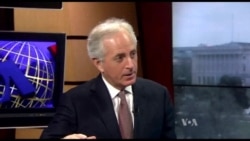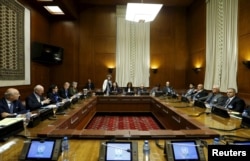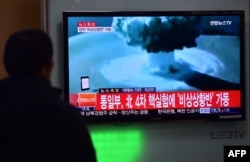The chairman of the Senate Foreign Relations Committee, Republican Bob Corker, voiced skepticism that nascent Syrian peace talks will end fighting or lead to the voluntary departure of President Bashar al-Assad.
“Very difficult at this point,” Corker said Monday in a wide-ranging interview with VOA . “I certainly support diplomacy, as I think everyone would, but the elements at present do not feel like they are in their proper place.”
Initial U.N.-mediated consultations in Geneva struggled to get underway one day after a suicide attack on a Shiite shine in Syria left scores dead and in the midst of a renewed government offensive on rebel territory. Corker noted that rebel negotiators’ basic conditions for launching the talks have not been met.
“The humanitarian things that they had asked for have not occurred. Not even the release of women and children that were born from rape from the prisons that Assad is overseeing,” the senator said.
Monday's talks were postponed until Tuesday. Instead U.N. envoy Staffan de Mistura met with the opposition for two hours.
Sunday, Secretary of State John Kerry urged Syria’s warring parties to commit to dialogue.
"I appeal to both sides to make the most of this moment, to seize the opportunity for serious negotiations, to negotiate in good faith with the goal of making concrete measurable progress in the days immediately ahead,'' Kerry said.
But Assad has no incentive to change tactics or give up power so long as his troops are advancing on the battlefield, according to Corker.
“The facts on the ground have been changing. You have Russia that has intervened, and certainly the Assad regime, because of their support and Iranian support, have been making gains,” the committee chairman said.
Iran
Turning to the international nuclear accord with Tehran, Corker said he wants the pact to succeed despite having opposed it and despite deep reservations that persist to this day.
“Since the agreement was agreed to they [Iran’s leaders] violated UN Security Council Resolutions relative again to ballistic missile testing. And yet, as you can see again there has been no pushback at all,” Corker said, adding that it is up to Congress “to do everything we can to hold Iran’s feet to the fire.”
He spoke as voters in Iowa were preparing to caucus for presidential candidates of both major political parties. Republican contenders have denounced the Iran nuclear accord. Senator Ted Cruz has pledged repeatedly to “rip the Iran deal to shreds” on his first day in the White House, if elected.
Asked about such comments, Corker counseled restraint.
“A new president coming in I think would most wisely look at the situation as it exists at the time,” Corker said.
“When people are running in primaries, sometimes they use rhetoric to show their resolve,” he added. “Probably the best way to do it is not to come in and rip it [abruptly terminate the pact], but to assess and move ahead based on where we are at the time.”
Earlier this month, President Barack Obama hailed implementation of the accord, saying Iran’s nuclear ambitions had been reined in without going to war.
North Korea
Last week, the Senate Foreign Relations Committee approved bipartisan sanctions on North Korea’s nuclear program that target entities that help Pyongyang supply and finance its military endeavors.
“Some of those entities will be Chinese,” Corker said. “The country that could really push back against what North Korea is doing is China … maybe this [new sanctions] will rattle China to take some steps in a more forward manner.”
The senator acknowledged that unforeseen consequences could arise from punitive measures against Pyongyang, but said inaction is the greater risk.
“What I’d actually say you’ve got is the unintended consequences of doing nothing,” Corker said. “They [North Korea] continue to do the ballistic missile testing.”
“They [North Korean leadership] are, yes, very unstable, and therefore bound, possibly, to make some irrational decisions down the road. So it’s either do some things now to change that [North Korean nuclear] trajectory, or likely end up with someone who is very unstable, who can dominate with that instability,” he added.
Asked about the Senate sanctions bill last week, State Department spokesman Mark Toner said, “We look forward to working with the Congress on a more vigorous response to North Korea’s actions.”







